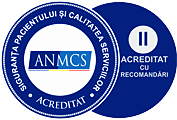Patient Rights - General Hopital
Extract from Law no. 46 from 01/21/2003
Patients have the right to health care at the highest standard regardless of their social status, age, gender, ethnicity, religion or political beliefs.
The patient's right to medical information
The patient has the right to be informed about available medical services and how to use them.
The patient has the right to be informed :
- On the identity and professional status of the health service provider
- About the rules and habits that they must observe during hospitalization
The patient has the right to be informed about his / her health status, proposed medical interventions, the potential risks of each procedure, the alternatives to the proposed procedures, including non-compliance and non-compliance with medical recommendations, as well as data on diagnosis and prediction.
The patient has the right to decide if he / she still wants to be informed if the information presented by the doctor would cause him / her suffering.
Information is brought to the attention of the patient in a respectful, clear language, with the minimization of specialized terminology; If the patient does not know the Romanian language, the information is brought to his / her knowledge in the mother tongue or in the language he or she knows or, if necessary, another form of communication will be sought.
The patient has the right to expressly request not to be informed and to choose another person to be informed in his / her place.
Relatives and friends of the patient can be informed about the evolution of the investigations, diagnosis and treatment, with the patient's consent.
The patient has the right to ask for and obtain another medical opinion.
The patient has the right to request and receive, upon discharge, a written summary of the investigations, diagnosis, treatment and care provided during hospitalization.
Patient's consent to medical intervention
The patient has the right to refuse or stop a medical intervention, assuming, in writing, the responsibility for his / her decision; The consequences of refusing or stopping medical records must be explained to the patient.
When the patient can not express his will, but an emergency medical intervention is required, the medical staff has the right to deduce the patient's agreement from an earlier expression of his will. If the patient requires emergency medical intervention, the consent of the legal representative is no longer necessary.
If the consent of the legal representative is required, the patient must be involved in the decision-making process, as much as his ability to understand.
If the team of specialists considers that the intervention is in the patient's interest and the legal representative refuses to give his / her consent, the decision is rejected by a specialized arbitration board. The arbitration panel consists of 3 doctors, hospitalized patients and 2 outpatient clinicians.
Patient consent is mandatory for the harvesting, storage, use of all biological products taken from his or her body in order to establish the diagnosis or treatment he or she agrees with. Patient consent is mandatory when participating in clinical medical education and scientific research. Scientific research can not be used for people who are not capable of expressing their will, except to obtain consent from the legal representative, and whether the research is done and in the interest of the patient.
The patient can not be photographed or photographed without his consent, unless the images are needed for diagnosis or treatment and for avoiding a suspected medical illness.
The right to confidentiality of information and the privacy of the patient
All information on the patient's condition, the results of the investigations, the diagnosis, the prognosis, the treatment, the personal data are confidential even after his death.
Confidential information may only be provided if the patient explicitly consents or expressly requests the law.
If the information is necessary for other accredited medical service providers involved in the patient's treatment, consent is no longer required.
The patient has access to personal medical data.
Any interference in the private, family life of the patient is forbidden, unless such interference positively affects the diagnosis, treatment or care provided, and only with the consent of the patient. Exceptions are considered to be cases where the patient poses a danger to himself or to public health.
Patient's rights to treatment and medical care
Medical interventions on the patient are carried out under the conditions according to which the hospital is authorized (only if there are necessary equipment conditions and accredited personnel). Exceptions from the previous provisions, emergency cases occurring in extreme situations are excluded.
The patient can benefit from family support, friends, spiritual support, material and advice throughout healthcare. At the request of the patient, as far as possible, the care and treatment environment will be created as close as possible to the family.
The patient is also entitled to medical services provided by an accredited physician outside the hospital (right to second opinion of another accredited physician outside the hospital, with the consent of the attending physician).
Medical or non-medical staff in the hospital have no right to subject the patient to any form of pressure to cause him to reward him otherwise than prescribe hospital legal regulation.
The patient is entitled to continuous medical care until he or she improves his / her health or healing.
The continuity of care (in situations that exceed the competence of the hospital) is ensured through collaboration and partnership between the hospital and the public medical, hospital and ambulatory, specialty or general medicine units, offered by doctors, middle cadres or other qualified personnel. After discharge, patients are entitled to community services available.
The patient is entitled to benefit from emergency health care in the public health system in a continuous program.

